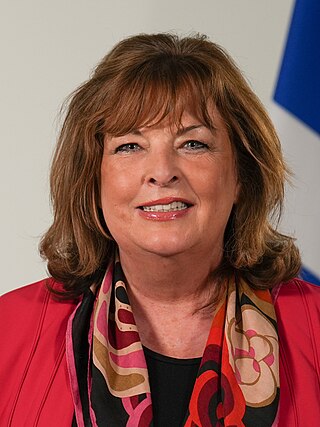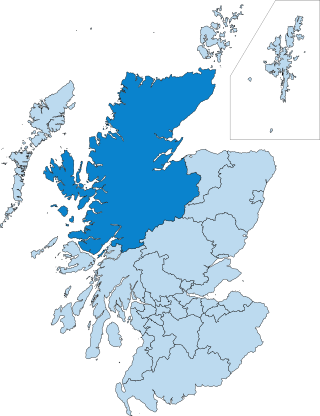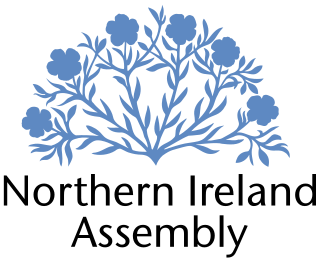Related Research Articles

The United Kingdom is a constitutional monarchy where executive power is delegated by legislation and social conventions to a unitary parliamentary democracy. From this a hereditary monarch, currently King Charles III, serves as head of state while the Prime Minister of the United Kingdom, currently Rishi Sunak since 2022, serves as the elected head of government.

The Scottish Parliament is the devolved, unicameral legislature of Scotland. Located in the Holyrood area of the capital city, Edinburgh, it is frequently referred to by the metonym Holyrood. The Parliament is a democratically elected body comprising 129 members known as Members of the Scottish Parliament (MSPs), elected for five-year terms under the regionalised form of additional member system (MMP): 73 MSPs represent individual geographical constituencies elected by the plurality (first-past-the-post) system, while a further 56 are returned as list members from eight additional member regions. Each region elects seven party-list MSPs. Each region elects 15 to 17 MSPs in total. The most recent general election to the Parliament was held on 6 May 2021, with the Scottish National Party winning a plurality.

A member of parliament (MP) is the representative in parliament of the people who live in their electoral district. In many countries with bicameral parliaments, this term refers only to members of the lower house since upper house members often have a different title. The terms congressman/congresswoman or deputy are equivalent terms used in other jurisdictions. The term parliamentarian is also sometimes used for members of parliament, but this may also be used to refer to unelected government officials with specific roles in a parliament and other expert advisers on parliamentary procedure such as the Senate parliamentarian in the United States. The term is also used to the characteristic of performing the duties of a member of a legislature, for example: "The two party leaders often disagreed on issues, but both were excellent parliamentarians and cooperated to get many good things done."

The administrative geography of the United Kingdom is complex, multi-layered and non-uniform. The United Kingdom, a sovereign state to the northwest of continental Europe, consists of England, Northern Ireland, Scotland and Wales. For local government in the United Kingdom, England, Northern Ireland, Scotland and Wales each have their own system of administrative and geographic demarcation. Consequently, there is "no common stratum of administrative unit encompassing the United Kingdom".

Annabelle Janet Ewing is a Scottish politician and lawyer who has served as Deputy Presiding Officer of the Scottish Parliament, alongside Liam McArthur, since May 2021. A member of the Scottish National Party (SNP), she has been the Member of the Scottish Parliament (MSP) for the Cowdenbeath constituency since 2016, having previously been an MSP for the Mid Scotland and Fife region from 2011 to 2016.

Fiona Jane Hyslop is a Scottish politician who has served as Cabinet Secretary for Transport since 2024. Hyslop has served in various offices under first ministers Salmond, Sturgeon, Yousaf and Swinney; as education secretary, culture secretary, and economy secretary as well as in junior ministerial roles. A member of the Scottish National Party (SNP), she has been a member of the Scottish Parliament (MSP) for the Linlithgow constituency since 2011, having represented the Lothians region from 1999 to 2011.

The Jatiya Sangsad, often simply referred to as Sangsad and also known as the House of the Nation, is the supreme legislative body of Bangladesh. The current parliament of Bangladesh contains 350 seats, including 50 seats reserved exclusively for women. Elected occupants are called members of Parliament, or MPs. The 12th national parliamentary election was held on 7 January 2024. Elections to the body are held every five years, unless a parliament is dissolved earlier by the president of Bangladesh.

Catherine Mary Jamieson is a Scottish business director, currently a director at Kilmarnock Football Club and former politician. She served as the Deputy Leader of the Labour Party in Scotland from 2000 to 2008. She previously served in the Scottish Executive as Minister for Justice from 2003 to 2007 and Minister for Education and Young People from 2001 to 2003. Jamieson was Member of the Scottish Parliament (MSP) for Carrick, Cumnock and Doon Valley from 1999 to 2011 and was a Member of Parliament (MP) for Kilmarnock and Loudoun from 2010 to 2015.

The Parliament of the United Kingdom currently has 650 parliamentary constituencies across the constituent countries, each electing a single member of parliament (MP) to the House of Commons by the plurality voting system, ordinarily every five years. Voting last took place in all 650 of those constituencies at the United Kingdom general election on 12 December 2019.
The UK Youth Parliament (UKYP) is a youth organisation in the United Kingdom, consisting of democratically elected members aged between 11 and 18.

In the United Kingdom, a member of Parliament (MP) is an individual elected to serve in the House of Commons, the lower house of the Parliament of the United Kingdom.

Scottish Westminster constituencies were Scottish constituencies of the House of Commons of the Parliament of Great Britain, normally at the Palace of Westminster, from 1708 to 1801, and have been constituencies of the House of Commons of the Parliament of the United Kingdom, also at Westminster, since 1801. Constituency boundaries have changed on various occasions, and are now subject to both periodical and ad hoc reviews of the Boundary Commission for Scotland.

The politics of the Highland council area in Scotland are evident in the deliberations and decisions of the Highland Council, in elections to the council, and in elections to the House of Commons of the Parliament of the United Kingdom (Westminster) and the Scottish Parliament (Holyrood). In the European Parliament the area was within the Scotland constituency, which covers all of the 32 council areas of Scotland.

The Scottish Youth Parliament (SYP) is a youth-led, democratic organisation which aims to represent the young people of Scotland.

Members of the Legislative Assembly are representatives elected by the voters to the Northern Ireland Assembly.

The 2007 Scottish Parliament election was held on Thursday 3 May 2007 to elect members to the Scottish Parliament. It was the third general election to the devolved Scottish Parliament since it was created in 1999. Local elections in Scotland fell on the same day.
Scotland uses different electoral systems for elections to Parliament, the Scottish Parliament and to local councils. A different system was also in use between 1999 and 2019 for United Kingdom elections to the European Parliament. Historically, only First Past the Post (FPTP) was used for all elections in Scotland, but this changed in 1999 both with the introduction of D'Hondt elections to the EU Parliament and the inception the same year of the devolved Scottish Parliament. Two of the devolved legislatures in the United Kingdom - the Scottish Parliament and the Senedd - use the Additional Members System (AMS). AMS has been used for every Scottish Parliament election since 1999, with the most recent being in 2021.
Electoral districts go by different names depending on the country and the office being elected.

Alison Johnstone is a Scottish politician who has served as the Presiding Officer of the Scottish Parliament since 2021. Elected as a member of the Scottish Greens, she relinquished her party affiliation on becoming Presiding Officer. She has been a Member of the Scottish Parliament (MSP) for the Lothian region since 2011.
The Bradford-Keighley Youth Parliament (BKYP) is a youth organisation of democratically elected young people aged 11–21.
References
- 1 2 3 "Member of Youth Parliament Rulebook 2024" (PDF). British Youth Council. Retrieved 22 February 2024.
- ↑ "Debatable, Issue Seven" (PDF). Archived from the original (PDF) on 2009-01-08.